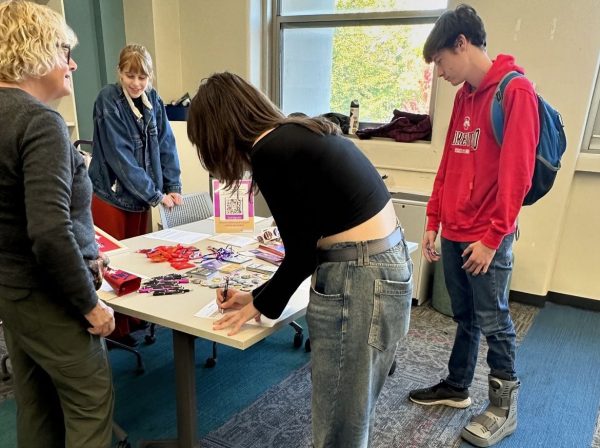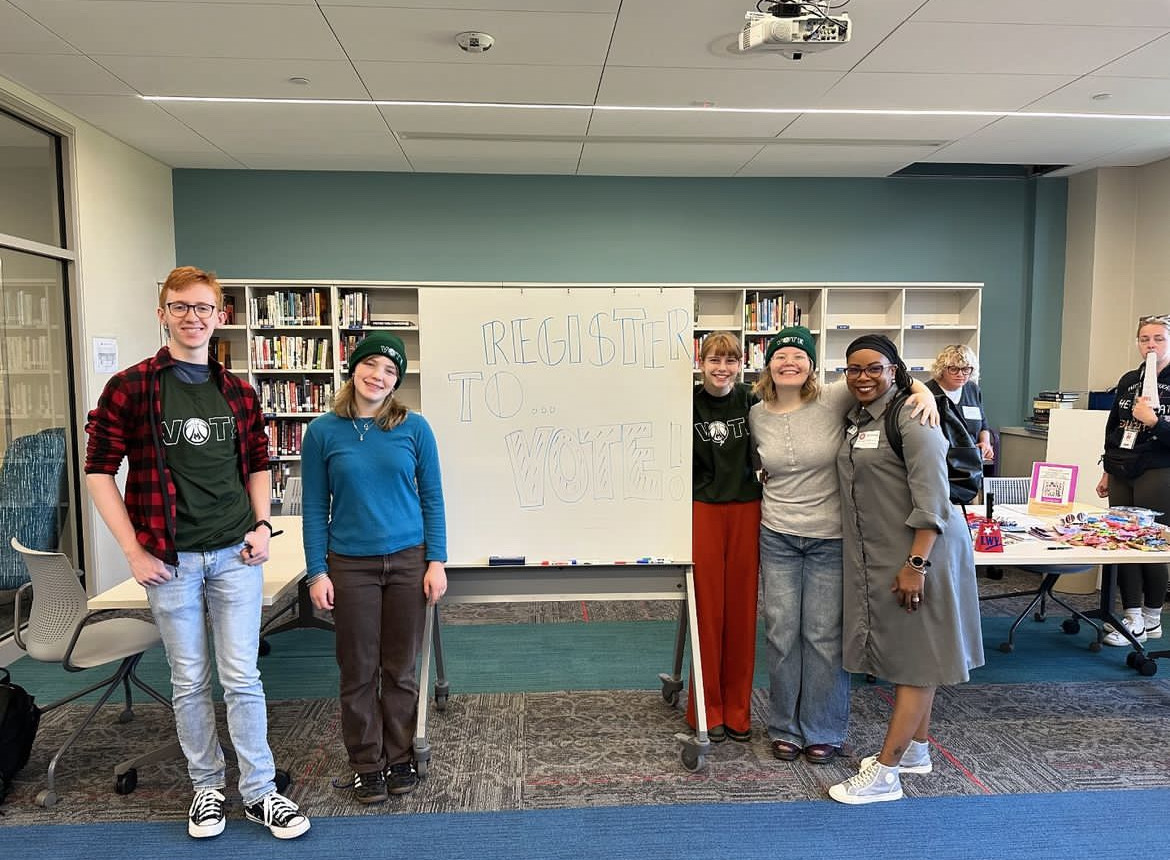With the November presidential election on the horizon, the American Civil Liberties Union (ACLU) and the League of Women Voters (LWV) partnered on October 10 for one of their annual voter registration events, focused on educating and empowering first-time voters.
The ACLU, a non-profit, non-partisan organization, works to promote civic education and engagement rooted in constitutional freedoms. Amelia Kohler, senior and co-president of the SHS chapter, says voting is an essential way of exercising one’s rights as a citizen, which motivates many of the club’s events.
“Every year, we try to do at least one voter registration, because a lot of 18-year-olds might not even know where to start when it comes to where and how they should register,” Kohler said. “It’s an easy way to get people who just turned 18 to register to vote, and voting is really important, because [it’s how] you fight for what you believe in.”
According to Kohler, twelve people registered at the event, and this number is expected to grow by spring as more seniors become eligible to vote. Lucy Kuhnen-Grooms, senior and co-president, hopes creating a supportive and informative environment at these events will further increase turnout.
“Getting registered can be intimidating, so making it available at school creates a more comfortable environment for those who have been putting [it] off,” Kuhnen-Grooms said. “The upcoming election results will have a big effect on the future of the US, so it’s important that as many people [as possible that are] eligible to vote do so.”
Judy Winn, co-director of the LWV’s High School Voter Registration Project, worked with ACLU student leaders to organize and run the event, as well as answer questions throughout the process. According to her, the program, in its fourth year of partnership with SHS, is centered around encouraging student participation in the democratic process.
“We are passionate about civic engagement of all people, of all ages,” Winn said. “In particular, we really want to get as many young people registered and then we hope that they will vote. We feel strongly that things won’t change unless people use the power they have, and they have that power through voting.”

Ashley Slomann, senior and first-time voter, feels her presence and political voice were valued throughout the process.
“My favorite part of the event was how nice everyone was and how appreciated I was to be a young woman voting,” Slomann said. “Everyone running it was super excited and actually cared about me having the right to vote. … I felt like I could express my wants politically and it would matter.”
Slomann also mentions leaving the event with a clearer understanding of what to expect come November.
“Without [the event runners] I wouldn’t have known how to register,” Slomann said. “They also explained to me all my options and how my ballot would look when the time comes. They made me feel like I was doing the right thing.”
Winn says these initial anxieties surrounding voting and the voting process can drive young people away from participating altogether.
“It can seem overwhelming, so we try to make it doable,” Winn said. “Some say they feel their vote doesn’t matter, and we explain that many elections are closely run. … They need to believe they have a voice and that change can happen.”
Slomann agrees and believes shifting the perception of politics from something inaccessible to something with real-world effects could pull in more young voters.
“I personally think a huge thing that leads young people away from wanting to vote is how politics are seen,” Slomann said. “I think if the experience was advertised as more personal and how your vote matters to your values [was emphasized], it would increase motivation.”
Winn envisions this change in perspective beginning at the community level.
“[Young people] need to see how issues and candidates directly impact their lives, like school referendums or taxes,” Winn said. “Voting isn’t just for president or senator, but for local candidates too, who can affect things like parking meters in Shorewood. Emphasizing the full range of candidates could help.”
Kuhnen-Grooms approaches civic education and encouragement with a similar perspective.
“I have constant faith that we, as a world, can improve,” Kuhnen-Grooms said. “While there are a lot of horrible things happening in our country that pile up and make it seem futile to even try and fix anything, there is also a lot of good being done. Be someone who does good while fighting against the [injustice] that surrounds us.”
Aside from a civic duty, Winn sees voting as a joyful act. After registering, students were greeted with a “congratulations table” offering pins, stickers, and treats.
“Events like this … help us celebrate the act of registering and voting,” Winn said. “I hope [young people] take pride in voting; it’s a big step into adulthood. That’s why we do the celebratory stuff at the end—it’s a big deal.”
Winn hopes events like these will give young people a foundation for engaging in the political process.
“Do your homework,” Winn said. “Go online and research from reputable sources. Look at what’s going to be on your ballot. Make sure you bring your photo ID. Consider early voting if you don’t like waiting in lines. But don’t miss the opportunity to vote.”

